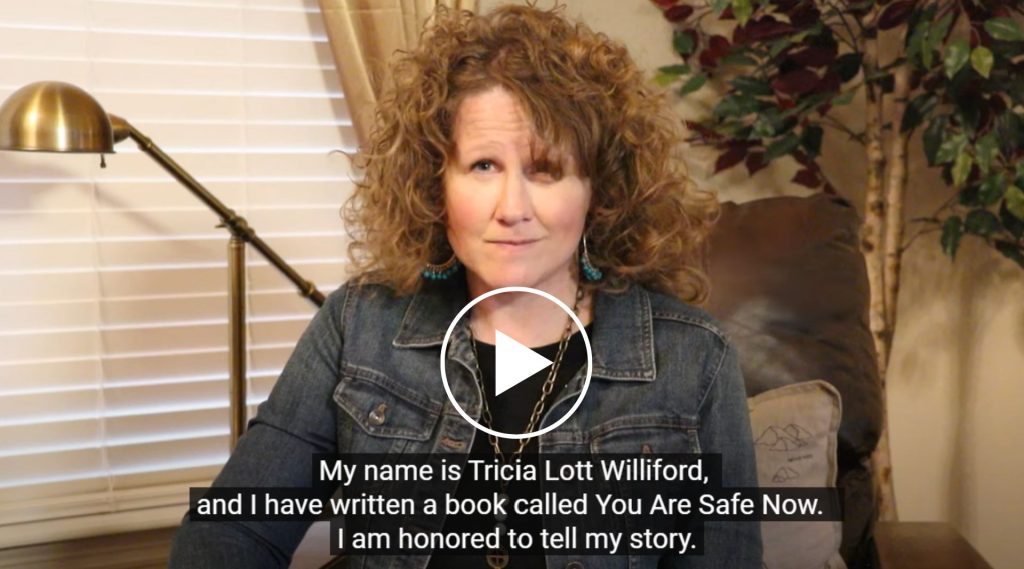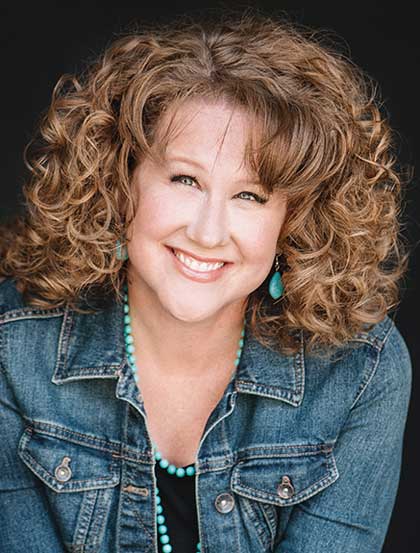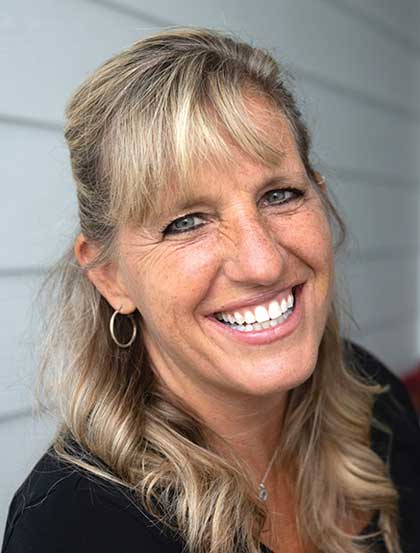Watch this video to familiarize yourself with this story.

This is a two-part series from the book, You are Safe Now: A Survivor’s Guide to Listening to Your Gut, Healing from Abuse, and Living in Freedom. In this first article, co-author Tricia Lott Wlliford (abuse survivor) tells part of her story. The abuser is refereed to as “Annie”. Here, Tricia tells not only what she knows now, but six things she didn’t know then. In releasing this deeply vulnerable story, Tricia hopes to help others caught in the dark web of abuse.
If you are a disciplemaker, a pastor, a church leader—someone who cares for the spiritual needs of others, you will want to read this article.
TRICIA’S STORY
To be sexually assaulted or abused is to be treated with an enormous measure of unkindness. The one who is recovering needs an extraordinary amount of patience, and Jana (my therapist) was present in the slow, steady way of kindness. She Swas with me, and she would be with me as long as it took.
She was consistent in her response:
“This was wrong. It’s wrong morally, but it’s also wrong personally. What was done to you was wrong on a personal level. You were violated. She violated you.”
A person who has been abused needs to hear this. I listened to her every time. I believed her sometimes.
My relationship with Annie (my abuser) had changed in the months since my husband, Robb’s, sudden death. After a long time staying in my home, she had gone back to her new home in her new town. I resolved that I wouldn’t be alone with her ever again. But I maintained contact with her, checking in with her and letting her check on me.
I watched from a distance as she targeted other women in the same way she had targeted me. I watched her choose and acquire. She had an addiction, and she was in deep. Her methods kept working.
In a text, Annie called me her “precious girl.” Autocorrect changed it to “previous girl.” Autocorrect has a Freudian accuracy sometimes.
Why didn’t I sever what was going on? Because I still felt responsible for her. The church had failed her. She had told me so herself. I wanted to be the one to do this differently. I thought I was with her, the way Jana was with me.
So I let my abuser have access to me. I thought I had to. I thought it’s what Jesus would do.
I have made a list of six things I didn’t know then.
- I didn’t know then that no is a full sentence.
- I didn’t know then that when someone doesn’t respect the word no, they are not respecting your consent.
- I didn’t know then how a manipulator can trap someone in unhealthy patterns and places, simply by making the word no seem selfish and upsetting.
- I didn’t know then that if someone feels ashamed when I won’t do what they’ve asked me to do, that doesn’t mean I have shamed them. When Annie told me that my no harmed her, made her feel ashamed of who she was, I believed her. I believed her feelings were my fault.
- I didn’t know then the patterns of codependency. I didn’t know it was a thing to want something for someone more than they want it for themselves.
- I didn’t know then that someone can weaponize shame to run over someone else’s no. I had said no to Annie in so many ways. But it never seemed to be loud enough, sure enough, locked tightly enough.
But isn’t one no enough? It should be. It should have been. I should not have had to keep saying no. My no should have been enough.
Jana had been telling me this was not my fault, but for some reason, her words weren’t enough for me.
I needed to reckon with my spiritual questions of guilt, sin, shame, and maybe even penance. I felt a deep longing to hear from someone in the church. The wounding had come from someone with spiritual authority, so the healing needed to involve someone with spiritual authority.
I wanted a second opinion.
I went to my pastor.
My pastor sat in his chair and steepled his fingers as he listened to my confession. When I finished, he asked me, “Did you enter this relationship with your consent?”
I thought about my constant stream of nos, the boundaries pushed and prodded over and over, the desecration in my most vulnerable moment. I thought about what Jana had taught me about the premeditation of an abuser, how Annie knew what she was doing far before I knew what she was doing. I thought about the numbness after the assaults, the disorientation, the bone-deep weariness, and the feeling like I had nowhere else I could go and nothing else I could do.
No, I did not consent to this.
“Did she ask you to keep secrets that would have destroyed her family and her career?” I thought about the night I made her leave, about “If you tell anyone, I’m toast.”
I thought of what Jana had taught me about the dark secrets and inside information, about how Annie had trapped me in a web of intercession and secret keeping.
Yes, the information she’d asked me to hold would have been destructive.
“Did you have a choice?”
I thought of how Annie had manipulated my intuition, teaching me that my instincts weren’t voices to trust in my decision making. I thought of how she twisted Scripture to her advantage, making me wonder if maybe I had been taught the wrong truth about so many things. I thought of how she told me this intimacy was the way of the church, that the only real choice was to obey—or not to obey—the laws of love. I thought about what Jana had taught me about undue influence, about coercive control, about the effects of sedatives and sleep aids. I thought about how I had learned that accountability becomes complicity only when you have all the information.
No, I did not have a choice.
He asked other questions about consent, about power imbalances, and about timing. He listened, he was quiet, and he thought.
Then he said, “Tricia, an affair is a mutual agreement, not a power play with only one person in charge. She knew what she was doing, long before you knew. That’s what a predator does. This was patient and premeditated and calculated. She waited for her moment, and I’m sorry to say, but with the death of your husband, she was handed a perfect storm.”
He leaned forward, his elbows on his knees, his eye contact intentional. He said, “It stops today, Tricia. You are safe now.”
I remember crying at the relief of those words.
He said, “Today, you will send an email to her, severing all contact. She may not contact you in any way, through any avenue. Copy me on that email, and she will know you are no longer alone in this. If you hear another word from her—ever, in any way—then you and I together will contact her employer and report this abuse.”
I followed his instructions that day. That was the last time I talked to Annie.
He showed me the way out, actual steps to take to break the chains she had on my life. I think back on it often, the day he said, “It stops today, Tricia. You are safe now.”
The strangest thing happened when I brought my shame into the open.
I didn’t die. I actually began to heal.
In part two of this series, co-author and therapist Jana Richardson, MA, LPC, EMDR, gives helpful insights for those suffering from abusive relationships, including three steps to take to separate yourself from your abuser.

Tricia Lott Williford
Tricia Lott Williford has written fifteen books in the last thirteen years. She has authored six titles under her own name and nine titles as a ghostwriter in collaboration with other authors, including a gold medalist, an Emmy award-winning journalist, and a candidate for President of the United States. Her work has appeared on the New York Times Bestseller list, and she has written with Penguin Random House, St. Martin’s Press, LifeWay, Tyndale, and NavPress. Tricia championed The Pen and The Page, a weekend writing retreat attended by hundreds of adults; she co-hosts the popular podcast Let’s Talk Soon; and during the school year, she teaches fourth grade at an elementary school near Denver. Tricia’s newest book is called You Are Safe Now: A Survivor’s Guide to Listening to Your Gut, Healing from Abuse, and Living in Freedom.

Jana Richardson, MA, LPC, EMDR
Jana Richardson is an experienced therapist in the Denver area with expertise in counseling victims of trauma, grief, and addiction.

1 thought on “Six Things I Didn’t Know When I Was in an Abusive Relationship”